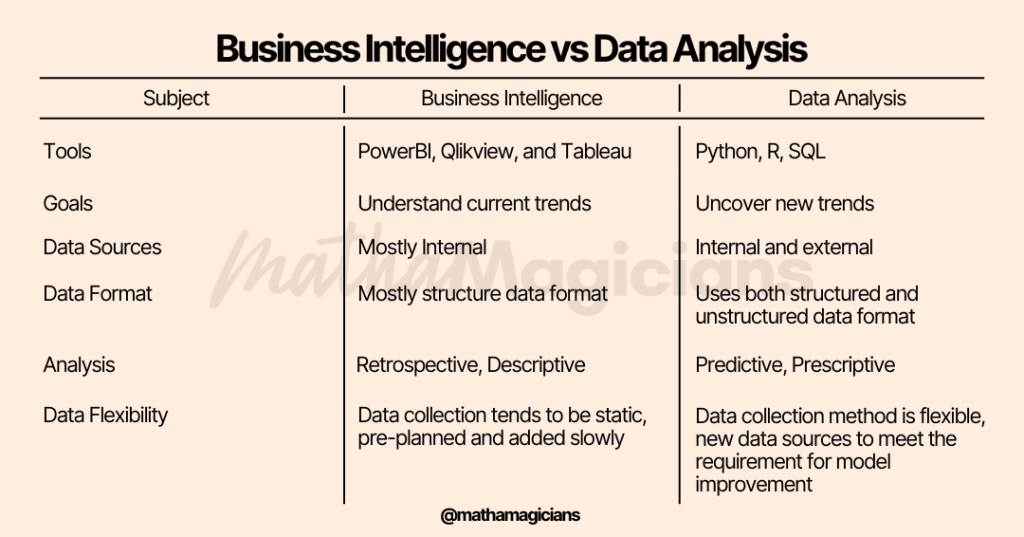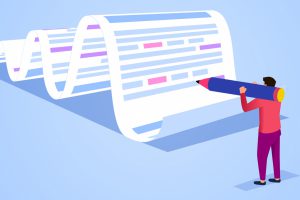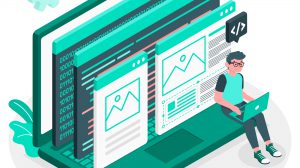We live in a constantly evolving world, daily, we are faced with an enormous amount of newness, new activities, choices, and products in which decision making can sometimes be swift or snail-like, but whichever model of decision making we choose, our choices will be based on our interpretation of various parameters and factors presented to us at that moment in time.
These interpretations involve answering some descriptive questions like what happened, what is happening with the use of business intelligence techniques or predictive questions like what will happen, what is the probability of an event occurring with the use of data analytics techniques.
Business intelligence and data analytics are two twin-like terms in the world of business decision making, although similar, they are both different depending on the use and techniques employed by the user.
Daily, businesses generate and have access to an enormous amount of both internal and external data, in order to stand out, there is a need to access, store, retrieve and analyze the data to generate actionable present and future insights for business sustainability and profitability.
What is Business Intelligent and Data Analytics?
Tableau describe Business Intelligence as the process of collecting, storing, and analyzing data from business operations, It provides comprehensive business metrics, in near-real-time, to support better decision making. In most businesses, the techniques of business intelligence is employed to track daily business operations delivering key insights that describes the efficiencies of these operations.
Data analytics is the technical process of mining data, cleaning data, transforming data, and building the systems to manage data. Data analytics takes large quantities of data to find trends and solve problems. It also transforms the enormous data available and employs mathematical techniques or algorithms to understand the data, find trends and make future decisions based on the outcome of the analysis.
Differences between business intelligence and data analytics
So what then are the differences between business intelligence and data analytics, if they both have a similar aim of generating insights for the end-user?
The following are some of the differences between business intelligence and data analytics;
1. Descriptive and Predictive Analysis: Business intelligence focuses on descriptive analysis, it provides intelligence into historical performance, and answers questions about what happened, it reports are designed to be run and viewed on a regular basis. In this case, a business will use PowerBI to track current sales trend, user acquisition or if employees are achieving their targets as seen in the key performance indicators.
Data analytics provides insights about likely future outcomes — forecasts, based on descriptive data but with added predictions using data science and often algorithms that make use of multiple data sets. It offers advice about what actions to take. It examines possible outcomes that result from different possible actions and suggests which actions will have optimal outcomes. For example, with data analytic techniques, a business might be able to predict which marketing campaign could be successful, type of products to launch, reduce fraud and diagnose business pain points.
2. Mathematics and Algorithms: In some cases and in order to generate predictive and diagnostics capabilities and analytical results, data analytics uses algorithms and mathematical expertise to do this. Data analytics involve the use of an algorithm to find patterns and relationships in a given dataset, this pattern is then used to predict future outcomes. Business intelligence does not make use of algorithms and it is mostly focused on describing the data and tracking performance of key business indicators.
3. Questions: In some cases, data analytics can be about iteratively asking questions. The answer to any given question is often viewed only once and used to inform the next question on our way to answering a fundamental business question or solving a problem.
In essence, data analytics tries to know why things happened, whereas business intelligence tries to know what happened. In some cases, it visualizes the current state of a target variable in a near real-time format.
Below offers a summary insights on additional differences that exists between business intelligence and data analysis

Similarities between business intelligence and data analytics
Whilst we’ve seen the differences between business intelligence and data analytics, it is noteworthy to recognize some of the similarities.
The following are some of the similarities between business intelligence and data analytics;
- Data: As noted earlier, both Business Intelligence and data analytics needs data for their individual processing techniques, in most cases, they both follow similar processes of collecting data, analyzing it, and providing insights.
- Insights and Report: Business intelligence and data analytics can be used to generate insights, these insights might be the business areas’ strength, weakness, opportunity, or threats. These insights are documented in the form of reports. These reports usually take the form of visualization to demonstrate value and make insights easier to discover and act upon.
- Decision: In both Business and data analytic, a decision is reached to either change the current way of working or maintain the status quo.
How useful is Business Intelligence and Data Analytics
The application of business intelligence and data analytics cannot be overemphasized enough, while we have been able to describe as well as see how business intelligence and data analytics are used, it is important to understand the applications of these techniques, when to apply these techniques and how to apply these techniques to generate actionable insights.











Add Comment